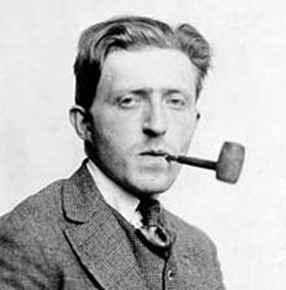Old Age
In me is a little painted square
Bordered by old shops, with gaudy awnings.
And before the shops sit smoking, open-bloused old men,
Drinking sunlight.
The old men are my thoughts:
And I come to them each evening, in a creaking cart,
And quietly unload supplies.
We fill slim pipes and chat,
And inhale scents from pale flowers in the center of the square . . .
Strong men, tinkling women, and dripping, squealing children
Stroll past us, or into the shops.
They greet the shopkeepers, and touch their hats or foreheads to me . . .
Some evening I shall not return to my people.
This poem is in the public domain. Published in Poem-a-Day on August 26, 2023, by the Academy of American Poets.
“Old Age” appears in Minna and Myself (Pagan Publishing Company, 1918). In Maxwell Bodenheim (Twayne Publishers, 1970), Jack B. Moore, former professor and chairman of the American studies department at the University of South Florida, writes that “Old Age [describes] a gentle drift into death [. . .]. The poet says he comes to his thoughts each evening and quietly contemplates the passing scene, the ‘strong men, tinkling women, and dripping, squealing children’ who stroll by. All is quiet, warm, muted, peaceful, as connoted in the nicely imaged old men, open-shirted, ‘drinking sunlight.’ These men may also represent the old thoughts who are in a real sense the only old friends the aged man might have. [. . .] The poem then ends abruptly with ‘Some evening I shall not return to my people.’ Naturally this line suggests death, and possibly that the ideas, thoughts, or emotions of the poet exist apart from the mind which is articulating them. The ‘old men’ remain, only the poet will go to them no longer.”

